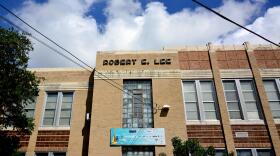UPDATE 10:00 pm: The Austin ISD Board of Trustees voted 8-0 to rename Robert E. Lee Elementary. Trustee Ann Teich abstained from voting.
The district will begin accepting nominations for new names on Tuesday and will present options to the board in May.
ORIGINAL STORY: The Austin School Board could vote tonight to change the name of Robert E. Lee Elementary School. It’s one of four Austin schools named after a Confederate leader. But, it’s the only school community that has mobilized to change the name, and one school board trustee is frustrated with how Austin ISD and the school board are handling the issue.
AISD Trustee Ted Gordon represents northeast Austin. He also represents a dwindling voice in Austin public schools: African Americans. Last year, fewer than 7,000 black students enrolled in Austin public schools—eight percent of the total student population.
Just six and a half percent of AISD teachers are black, and Gordon is the only African American school board member. He thinks that’s one reason why the school district and other school communities haven’t pushed harder to change the name of the other three schools named after Confederate leaders: John Reagan High School, Sidney Lanier High School, and Eastside Memorial at the Johnston Campus.
“If the school district was majority African American, the names would’ve been changed a long time ago,” he says. “And that would not have required a whole lot of discussion and back and forth and up and down and convincing this, that and the other thing.”
Gordon says the school board and the district administration could decide to change the names without a request from the community.
“No one seems to be concerned about having a real conversation about why it was that these schools were named after these folks, what it meant at the time for them to be named that way," Gordon says.
Trustee Ann Teich says she wouldn’t want to change the names without community support.
“Changing names [doesn't] do a whole lot to address the kind of change in racial attitudes, other prejudices, that needs to take place. I don’t see it as my role as a trustee to educate the communities,” Teich says. “At this point, if they’re not feeling that it’s a major issue, and there’s quite a bit of opposition that’s already organized at Lanier and Reagan against changing names.”
Teich is referring to public commenters, including her husband, at board equity meetings and full meetings last semester.
“I don’t think it’s necessary for us to bring that to the community’s attention. It’s just not a major issue for them and I think that if there is a change requested it needs to come from the community,” Teich says.
Gordon says a lot of the students at these other schools are Latino—many of the families have recently immigrated to, or weren’t educated in, the U.S.
“I don’t think they are really focused on Confederacy or the history of apartheid in the school district as a particular issue,” he says.
As many African American families leave Austin for more affordable suburbs nearby, Gordon says their voice gets quieter in these school communities. School Board Vice President Paul Saldaña agrees.
“Whenever you get into very sensitive conversations around these types of issue and racism, that’s where I think our community still has a lot of work to do,” Saldaña says.
Saldaña says even though the African American student population is small, 75 percent of students in Austin public schools are students of color.
“We do have an obligation to address this issue and it shouldn’t just be minority trustees or minority members of the community to bring this issue forward,” he says. “I think [Gordon]’s correct and we have an obligation to address it.”
Tonight’s board meeting starts at 7 p.m., but the board may not get to the Lee Elementary vote until after 9 p.m.






